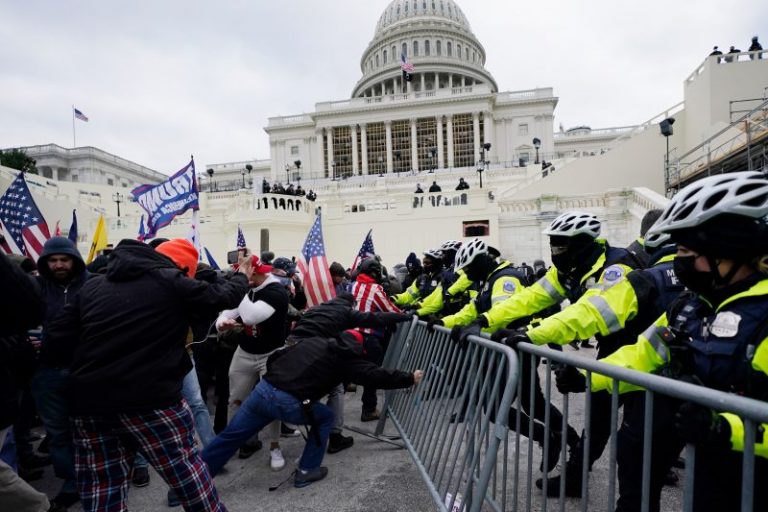A federal judge rejected a challenge to the government’s ability to disarm defendants as part of their criminal sentences, one of the first decisions to uphold the constitutionality of a gun ban for people on probation for misdemeanors since a watershed Supreme Court decision last year set a new test to evaluate such limits.
Chief U.S. District Judge James E. Boasberg in Washington issued the ruling temporarily barring gun possession by Daniel Shaw, a Jan. 6, 2021, Capitol attack defendant who pleaded guilty last November to one count of parading, demonstrating, or picketing.
“[W]hile Shaw’s role in the mob was minor, the fact of his participation in an insurrection whose aim was to impair the peaceful transfer of power suggests that a firearms restriction during his probationary period is appropriate,” Boasberg wrote on Thursday. “The nature of that event puts Shaw’s offense very far from the types of negligent infractions that some circuits have held do not warrant a firearms restriction.”
Courts have struggled to determine when and how the government may restrict the possession of firearms since the Supreme Court radically redrew the legal landscape in last June’s decision in New York State Rifle & Pistol Association v. Bruen, Boasberg noted. At least 58 courts have rejected challenges to legal prohibitions on the possession of firearms by felons, but his opinion is the first to address firearms restrictions as a misdemeanor probation condition in the District and apparently one of the first nationwide.
Federal defenders representing Shaw, 56, of Santa Rosa, Calif., challenged the gun ban condition in Shaw’s sentence to two years’ probation, including 10 days of incarceration, imposed March 17. Shaw entered the Capitol despite witnessing police deploying stun grenades and tear gas to keep rioters out.
Shaw’s attorney quoted the Supreme Court’s reasoning in finding the Second Amendment generally protects the rights of law-abiding Americans to carry a handgun outside the home for self-defense, and striking down a New York law that required a holders to show a “special need.”
“When the Second Amendment’s plain text covers an individual’s conduct, the Constitution presumptively protects that conduct,” wrote Elisse Larouche, assistant federal public defender for the northern district of California. While the court has found that the protections apply only to “ordinary, law-abiding citizens,” the government had not established a historical “tradition of generally prohibiting misdemeanants from possessing firearms,” Larouche argued.
“Prohibiting misdemeanant probationers from possessing firearms is not relevantly similar to disarming detainees, felons, or any of the other comparison groups proffered by the government,” she concluded, urging the court to reject Shaw’s probation ban.
Prosecutors disagreed, and Boasberg in his ruling said both sides argued the case too broadly. The question is not whether misdemeanor offenders can be permanently barred from possessing firearms under the constitution, but simply whether they can be while on probation.
People sentenced for crimes fundamentally have their rights restricted, the judge noted, and many forms of criminal punishment limit offenders’ liberty, such as incarceration, home detention or mandatory community service.
Probationers may be subjected to many requirements in addition to weapons bans, including warrantless searches, compelled provision of DNA samples, or prohibitions against running for office, engaging in political activity, using computers, contacting children or traveling.
Federal sentencing law generally requires that punishments be no greater than necessary under each case’s particular circumstances to achieve goals including deterrence, protecting the public, promoting respect for the law and providing correctional treatment. Courts handing down probation restrictions typically must factor in the specific purposes served, the legitimate needs of law enforcement and — what Boasberg called an “admittedly mushy” additional element — “the extent to which constitutional rights enjoyed by law-abiding citizens should be accorded to probationers.”
Boasberg found that Shaw was already on probation for driving under the influence with a minor child when he trespassed at the Capitol, and the firearms restriction would deter another future offense, facilitate his supervision and promote public safety, particularly since he received little prison time.
Ultimately, he found, like the First Amendment right to free speech and the Fourth Amendment right to due process, the Second Amendment “right is the quintessential example of a right that is susceptible to limitation during a term of probation.”
“After all, if there are any rights probationers can be deprived of — and, as discussed above, there certainly are — then a right that inherently applies with full force only to law-abiding citizens should be no exception,” he concluded.
Shaw argued that he possesses firearms for hunting and for self-defense, has long enjoyed hunting with his son and friends, and shown he is “a responsible custodian of his Second Amendment rights,” with no indication of misuse or dangerous behavior warranting this deprivation of his liberty and property rights.

